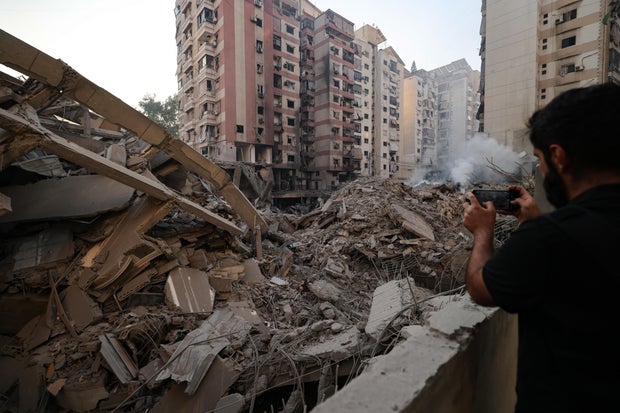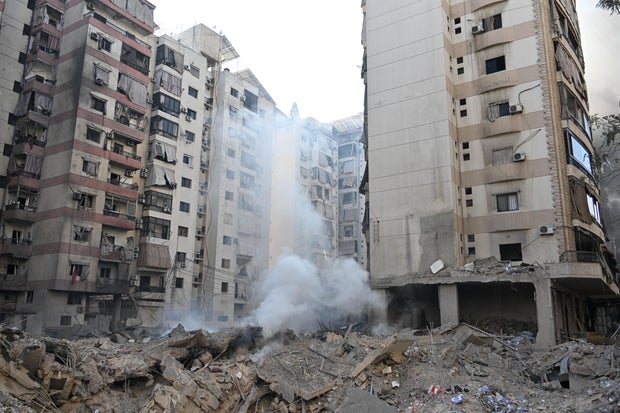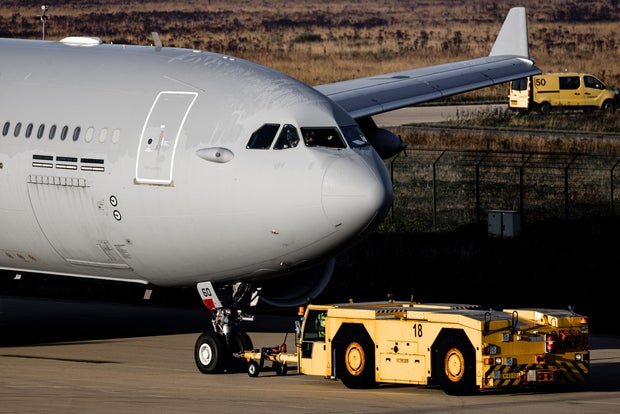CBS News
4 reasons the stock market is plunging — and what experts say you should do

A swift and sudden downdraft in global stocks is raising concern among ordinary investors about the impact on their portfolios and 401(k) plans.
The S&P 500 slid 171 points, or 3.2%, to 5,187 in early afternoon trading, while the Dow Jones Industrial Average fell more than 1,000 points, or 2.5%. The tech-heavy Nasdaq Composite saw an even steeper decline, sinking 3.8% and pushing its three-day loss to more than 9% following disappointing earnings from industry bellwethers including Amazon and Intel.
Notably, the slump follows what had been a bullish year, with the stock market reaching record highs that bolstered the retirement accounts of millions of U.S. workers. The whiplash may have some 401(k) savers questioning what’s behind the reversal, especially after the U.S. economy had appeared to be on solid footing, with steady growth and cooling inflation, thanks to the Federal Reserve’s flurry of interest rate hikes.
Here are four reasons why experts say the stock market is tumbling, along with their advice on what investors should do.
The Fed might have waited too long to cut interest rates
A range of signals in recent months suggest the economy is losing speed, leading some experts to urge the Federal Reserve to lower its benchmark interest rate for the first time since 2020. For now, however, the central bank has left rates unchanged, including more at its policy meeting last week.
Investors now fret that the Fed may have waited too long to ease borrowing costs for consumers and businesses, raising the risks of a recession.
“The real issue here is investors are worried the Fed is behind the curve in cutting interest rates, and that means there could be a bigger risk of a policy error,” Amanda Agati, chief investment officer of PNC’s asset management group, told CBS MoneyWatch. “The fear is that we might ultimately tip into a recession, versus that prior expectation for a soft landing.”
Economic data points to U.S. slowdown
Stocks has soared into record terrain this year, propelled by expectations the Fed would soon trim interest rates for the first time in for years and the ongoing artificial intelligence boom.
But market sentiment began to shift in mid-July as a growing number of economic signals pointed to a slowdown in growth. Those concerns intensified on August 2 after data showed a dip in manufacturing and construction, while a weaker-than-expected employment report added to Wall Street’s fears about the economy running out of steam.
Potentially more worrisome is that consumer spending — which accounts for roughly two-thirds of economic activity — is showing signs of weakness. Companies such as McDonald’s and Walmart are reporting that their customers are cutting back amid the strain of still-elevated inflation and high borrowing costs.
Still, some experts caution that such data points might turn out to be a blip, rather than a trend.
“Without stating the obvious, one month does not make a trend, so next month’s jobs report will be very important,” said Seema Shah, chief global strategist at Principal Asset Management, in an email. “It’s worth pointing out that the April 2024 payroll number was initially 165,000 and then was revised down to 108,000 before rebounding to 216,000 the following month.”
Tech stocks are a victim of high expectations
Some of the worst-hit stocks during the rout can be found in the tech sector, with the so-called Magnificent Seven, a group of tech stocks including Amazon, Apple and Nvidia, among the market’s worst performers on Monday. Nvidia, the chip company whose technology powers artificial intelligence, has shed 23% of its value since July 31.
Prior to last week, these stocks had been among the year’s best performers, which meant that Wall Street had lofty expectations for their revenue and profit growth. And while their earnings reports have been solid so far this year, they haven’t wowed investors.
“Even if earnings come in as expected, the valuation multiples are so high that it’s hard to sustain” those prices, PNC’s Agati said. “Investors are panicking, and this is a really rapid sentiment shift.”
She added, “We don’t think the underlying fundamentals support this shift. For the most part, the Magnificent Seven have been fine in terms of earnings results.”
Japan’s interest rate hike
Professional investors also pointed to the impact of the Bank of Japan’s move last week to raise its main interest rate from nearly zero.
This boosted the value of the Japanese yen. But it has also forced traders to unwind investments in which they had borrowed money in Japan at near-zero interest rates and then converted the yen into dollars, which they then used to buy U.S. stocks. In other words, traders have had to sell assets to cover their trades, which could be feeding into the stock market declines, experts said.
“This ‘carry trade’ has been unraveling in recent weeks and might have crescendoed on Friday,” according to Yardeni Research.
What should investors do?
First it’s important to understand that stock downturns — even sharp ones — are common. Although the S&P 500 is down roughly 8% from its peak in July, drops in equity prices of 5% or more have occurred at least once a year for the past four decades, according to Oxford Economics. Market corrections, or a drop of at least 10% from their highs, occur an average of every one and half to two years, the firm said in a report.
But even bear markets, or when stocks decline at least 20% from their peak, are normal and aren’t a reason to panic, experts say. While the temptation might be to sell, it’s best to resist that urge, especially for people saving for the long-term such as for retirement. Market timing, or trying to buy and sell stocks to capture gains and avoid losses, is notoriously difficult and can lead to lost opportunities, research from Charles Schwab has found.
“If you are a long term investor, take a deep breath — it is very scary, I get it,” Jill Schlesinger, the business analyst for CBS News, told the network. “As long as you are in a long-term portfolio, you shouldn’t worry.”
Moving into cash “is never a good investment,” added PNC’s Agati. That’s especially the case when the Fed is widely expected to cut rates as early as September, which will reduce the returns for savings accounts and money market funds.
“If you are worried about your retirement plan, I wouldn’t be pulling the plug and moving to cash,” Agati added, noting that he would look at investment-grade fixed income investments or U.S. Treasuries because they may provide more attractive yields moving forward.
CBS News
Israel airstrikes rock parts of Lebanon as Hezbollah launch rockets at air base near Haifa

The escalating fighting between Israel and Hezbollah continued Saturday as both sides traded strikes as the war in Gaza nears one year.
The Israel Defense Forces said its air force struck Hezbollah fighters inside a mosque in southern Lebanon that they said was used as a command center to “plan and execute terrorist attacks against IDF troops and the State of Israel.”
The mosque was adjacent to Salah Ghandour Hospital in the town of Bint Jbeil. The hospital said in a statement that Israeli forces had shelled it after being warned to evacuate. The shelling “resulted in nine members of the medical and nursing staff being injured, most of them seriously,” while most of the medical staff were evacuated. On Thursday, the World Health Organization said 28 health workers in Lebanon had been killed in the past 24 hours.
ANWAR AMRO/AFP via Getty Images
At the same time, 12 Israeli airstrikes hit Beirut’s southern suburbs, including one that badly damaged a large hall Hezbollah used to hold ceremonies, Lebanon’s state news agency said.
Later in the day, more strikes hit the area, from which tens of thousands of people have fled over the past two weeks.
Israeli airstrikes also hit areas in southern and eastern Lebanon, according to state media. At least six people were killed, according to NNA.
Meanwhile, Hezbollah said it launched a series of rockets at an Israeli air base near Haifa, about 30 miles from the Lebanese border. Israeli police said fragments of interceptors fell in several sites but no injuries were reported, according to the Associated Press.
Israel has sharply expanded its strikes on Lebanon in recent weeks after nearly a year of exchanging fire with the Iran-backed Hezbollah — long designated a terrorist organization by the U.S., Israel and many other nations. The IDF has been carrying out nightly bombardment of Beirut’s once densely populated southern suburbs, a stronghold of Hezbollah. Overnight, a military spokesman issued three alerts for residents there to evacuate.
Houssam Shbaro/Anadolu via Getty Images
Nearly a week of Israeli ground operations in southern Lebanon, near Israel’s northern border, and two weeks of airstrikes in that region and in southern Beirut — both Hezbollah strongholds — had killed more than 2,000 people, the health ministry said. More than 1 million people have been driven from their homes, including tens of thousands under Israel evacuation orders in almost 100 towns and villages near the border.
Hezbollah started launching those attacks in support of its ideological ally Hamas, which is also backed by Iran, the day after Hamas sparked the ongoing war in Gaza with its Oct. 7, 2023 terrorist attack on Israel. The IDF says Hezbollah militants have fired over 10,000 rockets across the border since Oct. 8, 2023. The vast majority of them have been intercepted by Israel’s advanced missile defense systems.
Israel conducts more ground raids
The Israeli military said on Saturday its special forces were carrying out ground raids against Hezbollah infrastructure in southern Lebanon, destroying missiles, launchpads, watchtowers and weapons storage facilities. The military said troops also dismantled tunnel shafts that Hezbollah used to approach the Israeli border.
Some 1.2 million people have been driven from their homes since Israel escalated its strikes in late September aiming to cripple Hezbollah and push it away from the countries’ shared border. On Tuesday, Israel launched what it calls a limited ground operation into southern Lebanon.
Nine Israeli troops have been killed in close fighting in the area in the past few days, which is saturated with arms and explosives, the military said.
Americans attempt to leave Lebanon
The U.S. government has warned Americans not to travel to Lebanon since mid-September and urged any citizens in the country to leave via commercial travel routes. As of Friday night, the U.S. State Department has assisted approximately 500 U.S. citizens, permanent residents and their families to leave Lebanon on flights organized by the agency.
Other nations are also working to evacuate their residents from Lebanon. Germany has evacuated 460 citizens on German military flights, while a Dutch military transport plane carried more than 100 citizens out of Lebanon. There were also citizens of Belgium, Finland and Ireland who were repatriated on that flight.
ROB ENGELAAR/ANP/AFP via Getty Images
“It’s great that these people are safely back in the Netherlands. These have been tense times for them,” Christiaan Rebergen, secretary-general of the foreign ministry, said after they landed Friday.
Fighting ongoing in Gaza
Palestinian medical officials say Israeli strikes in northern and central Gaza early Saturday have killed at least nine people, including two children.
One strike hit a group of people in the northern town of Beit Hanoun, killing at least five people, including two children, according to the Health Ministry’s Ambulance and Emergency service.
Another strike hit a house in the northern part of Nuseirat refugee camp, killing at least four people, the Awda hospital said. The strike also left a number of wounded people, it said.
The Israeli military did not have any immediate comment on the strikes but has long accused Hamas of operating from within civilian areas.
Earlier in the day, the Israeli military had warned residents in parts of central Gaza to evacuate, saying its forces would soon operate there in response to Palestinian militants.
The warnings cover areas along a strategic corridor in central Gaza, which was at the heart of obstacles to a ceasefire deal earlier this summer. The military warned Palestinians in areas of Nuseirat and Bureij refugee camps, located along the Netzarim corridor, to evacuate to an along Gaza’s shore called Muwasi, which the military has designated a humanitarian zone. It’s unclear how many Palestinians are currently living in the areas affected by the order, parts of which were evacuated previously.
Almost 42,000 Palestinians have been killed in Gaza during the almost year-long war, according to the Palestinian Health Ministry, which does not differentiate between civilian and militant deaths.
CBS News
1-month-old twins who died with mother believed to be the youngest-known Hurricane Helene victims

Month-old twin boys are believed to be the youngest known victims of Hurricane Helene. The boys died alongside their mother last week when a large tree fell through the roof of their home in Thomson, Georgia.
Obie Williams, grandfather of the twins, said he could hear babies crying and branches battering the windows when he spoke with his daughter, Kobe Williams, 27, on the phone last week as the storm tore through Georgia.
The single mother had been sitting in bed holding sons Khyzier and Khazmir and chatting on the phone with various family members while the storm raged outside.
AP
Kobe’s mother, Mary Jones, was staying with her daughter, helping her take care of the babies. She was on the other side of the trailer home when she heard a loud crash as a tree fell through the roof of her daughter’s bedroom.
“Kobe, Kobe, answer me, please,” Jones cried out in desperation, but she received no response.
Kobe and the twins were found dead.
“I’d seen pictures when they were born and pictures every day since, but I hadn’t made it out there yet to meet them,” Obie Williams told The Associated Press days after the storm ravaged eastern Georgia. “Now I’ll never get to meet my grandsons. It’s devastating.”
The babies, born Aug. 20, are the youngest known victims of a storm that had claimed more than 200 lives across Florida, Georgia, Tennessee, Virginia and the Carolinas. Among the other young victims are a 7-year-old girl and a 4-year-old boy from about 50 miles (80 kilometers) south in Washington County, Georgia.
“She was so excited to be a mother of those beautiful twin boys,” said Chiquita Jones-Hampton, Kobe’ Jones’ niece. “She was doing such a good job and was so proud to be their mom.”
Jones-Hampton, who considered Kobe a sister, said the family is in shock and heartbroken.
In Obie Williams’ home city of Augusta, 30 miles east of his daughter’s home in Thomson, power lines stretched along the sidewalks, tree branches blocked the roads and utility poles lay cracked and broken. The debris left him trapped in his neighborhood near the South Carolina border for a little over a day after the storm barreled through.
He said one of his sons dodged fallen trees and downed power lines to check on Kobe, and he could barely bear to tell his father what he found.
Many of his 14 other children are still without power in their homes across Georgia. Some have sought refuge in Atlanta, and others have traveled to Augusta to see their father and mourn together, he said.
He described his daughter as a lovable, social and strong woman. She always had a smile and loved to make people laugh, he said.
And she loved to dance, Jones-Hampton said.
“That was my baby,” Williams said. “And everybody loved her.”
CBS News
Telecom providers operate emergency communications after Hurricane Helene

Watch CBS News
Be the first to know
Get browser notifications for breaking news, live events, and exclusive reporting.












